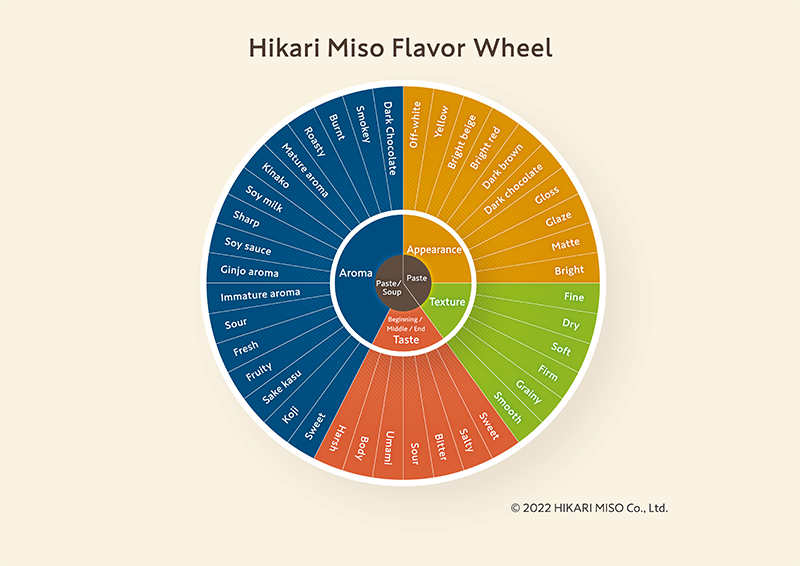
What is Miso?
Much of the history of Japan is written in miso. For more than 1,300 years, the Japanese people have cultivated this indispensable seasoning for its robust flavor and nutritious properties. The delicate yet dynamic fermentation process breaks proteins down into peptides, which aid the digestive system, and amino acids, which create umami, or distinctive, mouthwatering flavor.
Quintessentially Japanese and sustainably crafted, Hikari Miso is the embodiment of nature’s best – always made from the most nutritious, freshest soybeans, koji and salt.
Exceptionally healthy
Miso is one of the most nutritious foods on the planet. Packed with twelve percent of plant protein, with minerals and vitamins E, B12 and K.
When added to vegetables, miso enhances their flavor and help to boosts digestive health, thanks to the peptides produced during the fermentation process that help your body maintain a healthy level of bacteria in your gut.
Eating miso regularly can also help you maintain a healthy body weight, as the miso’s nutrients support to clean your body, and its protein keeps you feeling full for longer.
What makes miso so healthy?

Other reasons why eating
miso regularly is good for us
Fermentation
Fermentation is the work of
enzymes which help make proteins
and starches in miso more easily
absorbed by our digestive system.
Plant-based protein
Soybeans are loaded with super healthy plant-based protein. Protein also makes you feel full for longer than carbs do.
Rich nutrients
Miso contains minerals, as well as
vitamins E, B12 and K.
Clean your body naturally
Eating miso regularly can help you maintain your health, because it works to detoxify the body. Miso works to clean your body naturally and enhance to protect your body.
About sodium
When miso is used to flavor vegetables, the fiber in the veggies & miso help to decreases your salt absorption, and the veggies’ potassium helps you excrete salt.
Our Ingredients
No shortcuts, no exceptions. This is the Hikari Miso standard. We use only organic ingredients of the highest quality, sourced from the most wholesome places on earth.

Soybeans
Soybeans are the main ingredient in miso. They are a rich source of protein, fiber, vitamins, and minerals. All the soybeans used in Hikari Miso products are not genetically modified, always.

Koji
rice, soybeans, barley
Koji is the mold culture that grows over steamed rice, soybeans, or barley, generating active enzymes. Enzymes break soybean protein into amino acid and peptides. Enzymes also break carbohydrates of rice and soybeans into glucose.

Salt
In miso, salt acts as a preservative, inhibiting the growth of undesirable microbes, as well as impacting the flavor. Hence historically in Japan miso has been non-perishable preserved food.

Water
The water we use is from the Japanese Alps. Clean and soft water is essential to create high quality, rich tasting miso. In every phase of our miso production, we use this pure water.
Fermentation and aging
The amount of time miso is allowed to mature, and in what environmental conditions, greatly influences the miso’s flavor and quality. The longer miso ages, the more time it has to ferment – during which koji enzymes break down proteins into peptides, which support to maintain our body, and amino acids, which add complexity and umami.
Proper aging also softens the stimulating taste felt on the tongue, developing a broader and richer taste consists of umami, saltiness, sweetness, sourness, and bitterness, all five tastes in perfect balance.
We at Hikari Miso pride ourselves on mastering to refine the delicate balance of fermentation and aging to produce a consistently delicious, nutritious, versatile seasoning and food.
About Organic and Sustainability
We are proud to be the number one producer of organic miso in the world, lovingly crafted in our certified organic manufacturing facility in Nagano, Japan. Needless to say, products do not include artificial flavor and preservatives.
non gmo
gluten free
no added msg
organic

Soybeans
Soybeans are a remarkable plant. They synthesize nitrogen from the air and produce protein, the sustenance of life for all humans and animals. Thus, we revere and respect soybeans, and we nurture the environment as we work with nature to bring out the best of this miraculous bean in every batch of our miso.
We use non-GMO soybeans, as well as organic non-GMO soybeans, from suppliers in all over the world committed to the highest standards from growth and harvestation through production and distribution.

Koji
Koji is the miso ingredient that activates the all-important process of fermentation. It’s prepared by adding koji mold to steamed grains (rice, barley, or soybeans) and then carefully culturing it in warm, humid conditions.
Historically, miso producers in Japan have used a mold culture to catalyze the fermentation process and create a variety of distinctively Japanese foods. In the making of miso, soy sauce and sake, yellow koji mold is typically used. Koji mold – also known as koji kin or Aspergillus oryzae – is the National Mold of Japan!
Koji Making

1
Steamed rice
Spread the spore of Koji on the rice

2
Hypha on rice
Hypha grows after several hours

3
Breakdown Enzyme
Hypha secretes and causes enzyme breakdown

4
Koji
After 40 hours, koji making is complete
SHIO KOJI
Shio Koji is a fermented seasoning made from only rice malt, salt, and water.
Used in Japan for centuries as a seasoning or ingredient, Shio Koji has seen resurgence in popularity in recent years with the increased interest in fermented foods. The enzymes contained in Shio Koji break down proteins to pull out umami and this process also contributes to tenderizing meat and fish. The enzymes also decompose starches to draw out the sweetness from ingredients.
Looking like rice porridge, Shio Koji takes on a faint sweet flavor for a sweet and salty taste, has a slightly fermented smell. Depending on the fermentation time and the amount of water, it matures in different forms and textures. It can come in a puree, paste, near solid or even powdered.
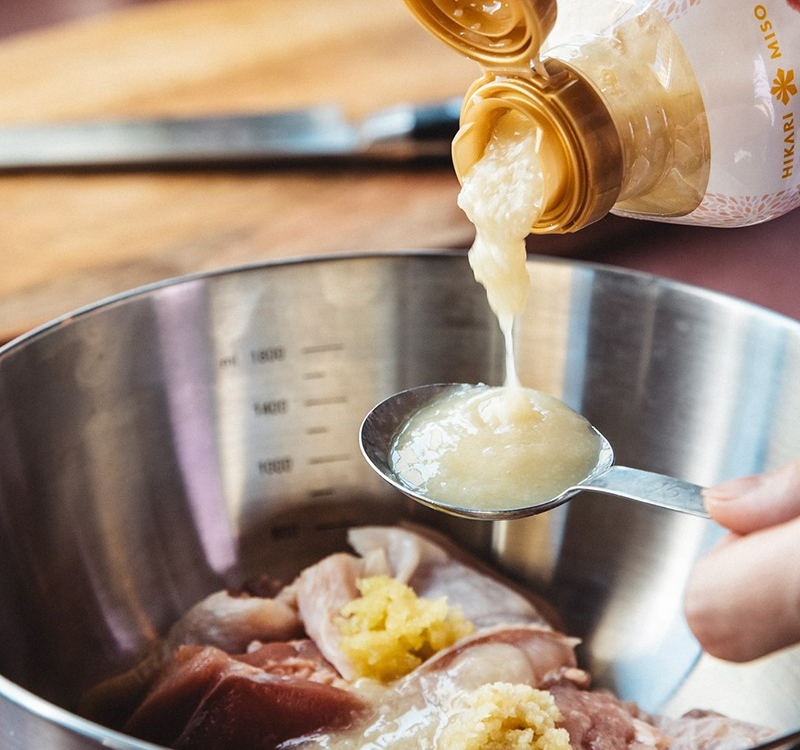
All-Star Seasoning
Known to be an all-purpose seasoning, Shio Koji can be the multi-tasking seasoning in your kitchen. Shio Koji’s convenience is another reason this traditional ingredient recaptured the spotlight in Japan. Shio Koji can be simply poured onto meat or fish as a marinade and added as a sauce or finishing touch. It can also be used in place of salt by substituting two teaspoons of Shio Koji for every teaspoon of salt.
Types of Miso
All miso is created using soybeans, salt and water, but the type of miso is determined by which grain (rice, barley, or soybean) is paired with koji mold spores and carefully mixed with the soybeans and salt to ferment and age the miso to perfection.
Rice Miso
(KOME MISO)
Rice miso is made from rice-koji, soybeans, water, and salt. Ranging from bright yellow colored miso to long-fermented red colored miso, kome miso represents a fairly wide range of flavors. Lighter color miso brings mild, sweeter flavors to vegetables and fish, while longer-fermented miso makes meats, broths, and veggies more savory.
Pure Soybean Miso
(MAME MISO)
Soybean miso, or Mame Miso or Haccho Miso, is made from koji-cultured soybeans and salt only. It is typically “long fermented”, which infuses the pure soybean miso with black color and deep flavors that layer complexity.
Barley Miso
(MUGI MISO)
Made of barley-koji, soybeans, water, and salt, our mugi miso has bright beige color, very robust and strong body, and a deep aroma, all of which are coming from long fermentation and aging period.
MISO FLAVOR WHEEL
Hikari Miso is the first in the miso industry* to create the original flavor wheel that defines the characteristics of miso. Hikari Miso confidently believes that any trading partners, chefs, and consumers worldwide utilize “Hikari Miso Flavor Wheel” to help them select the miso that best suits their individual needs.
*Public information as “Flavor Wheel of Miso” (own research, October 2022)
What is a Flavor Wheel?
Flavor Wheel is one of the tools to express the characteristics of food (taste, aroma, texture, color, etc.). It is used to evaluate the taste of beverages and alcoholic beverages, such as coffee and wine, and to suggests consumers for good match between food and drink. In Japan, the Flavor Wheel has been presented for sake, soy sauce, etc., which are unique to the country.
Hikari Miso Flavor Wheel
Miso, a traditional Japanese food, has a variety of characteristics depending on the regions and manufacturers. We created the “Hikari Miso Flavor Wheel” in the belief that it makes the sensory expression of miso a common language, so everyone can enjoy to understand the difference among many varieties of miso. Sensory evaluations were conducted using seven distinctive miso products, and discussions were held with reference to 165 different sensory expressions. Since the aroma and taste of miso changes when it is cooked to make miso soup, we created a wheel that distinguishes miso paste as “paste” and miso soup as “soup”, and devised ways to convey each attribute. Including the evaluation of color, which is an essential quality of miso, we defined forty different characteristics to install into our original “Hikari Miso Flavor Wheel”.
Hikari Miso is very much willing to make best use of “Hikari Miso Flavor Wheel” to help enhance the trading partnership and to help any miso consumers and users enjoy varieties of miso.
Definitions of the words
Gloss: Fresh luster (used for white miso)
Glaze: Strong luster as if shining back (used for red miso)
Matte: Grayish dark color
Harsh: Bitter taste that tangles on the tongue (lye from bamboo shoots, wild vegetables, spinach, etc.)
Koji: Cultured rice, Ingredient of miso
Sake kasu: Sake lees, by-product of sake making process
Ginjo aroma: Aroma of fermentation with sweetness
Sharp: Sharp and salty sensation
Kinako: Roasted soy flour
Smoky: salty and savory (smoked, smoldering)
TYPES BY COLOR AND TEXTURE
Hikari Miso defines categories of six major colors and three major textures, encompassing a full spectrum of flavors and textures as outlined below.
COLOR

Off-White
Like a color of custard cream
Our Offer: Saikyo Sweet Miso
Yellow
Defined as a typical color of white miso
Our Offer: Organic White Miso Mild Sodium
Bright Beige
Yellow with orange tinge
Our Offer: Organic White Miso
Bright Red
Defined as a typical color of red miso
Our Offer: Organic Red Miso
Dark Brown
Like a color of golden toffee, milk tea, biscoff, gingerbread
Our Offer: Red Miso
Dark Chocolate
Dark red brown color. Bitterness of this miso really tastes like a dark chocolate.
Our Offer: Pure Soybean Miso
Texture
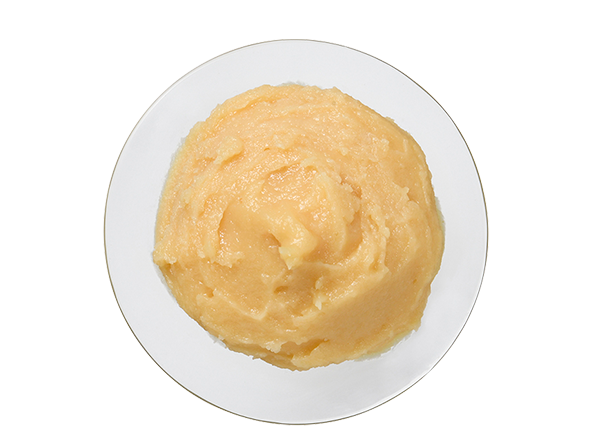
EXTRA SMOOTH
This distinctive characteristic is often observed in miso with a higher rice koji ratio, resulting in a fine texture and a creamy mouthfeel similar to cream cheese. The abundance of rice koji, which is softer than soybeans, contributes to the miso’s smoothness when it is mashed.
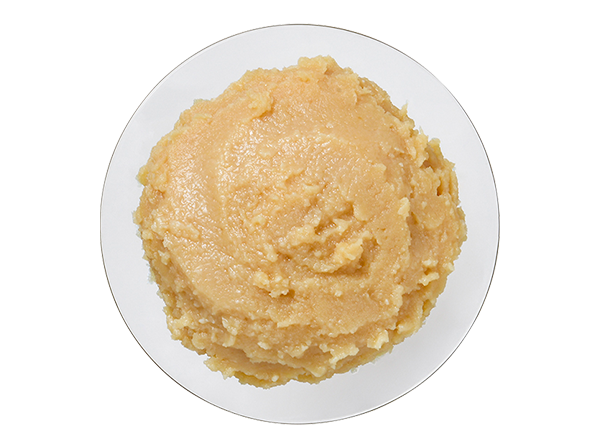
SMOOTH
This miso brings a smooth texture by using ground soybeans and rice koji grains. There’s no need to strain the grains during cooking, making it an ideal choice for those who wish to avoid any leftover grains in a dish.
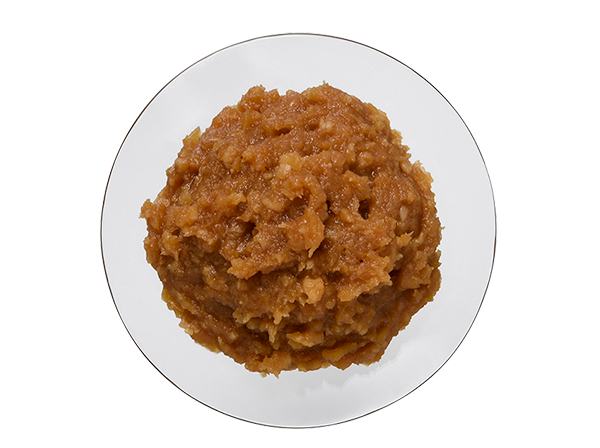
WITH SMALL GRAINS
Known as “koji miso” in Japan, this miso uses soybeans and rice koji grains. It has a more robust aroma than the smooth type, and when you bite into the grains, you can taste the umami flavor of the soybeans and the sweetness of the rice koji.




